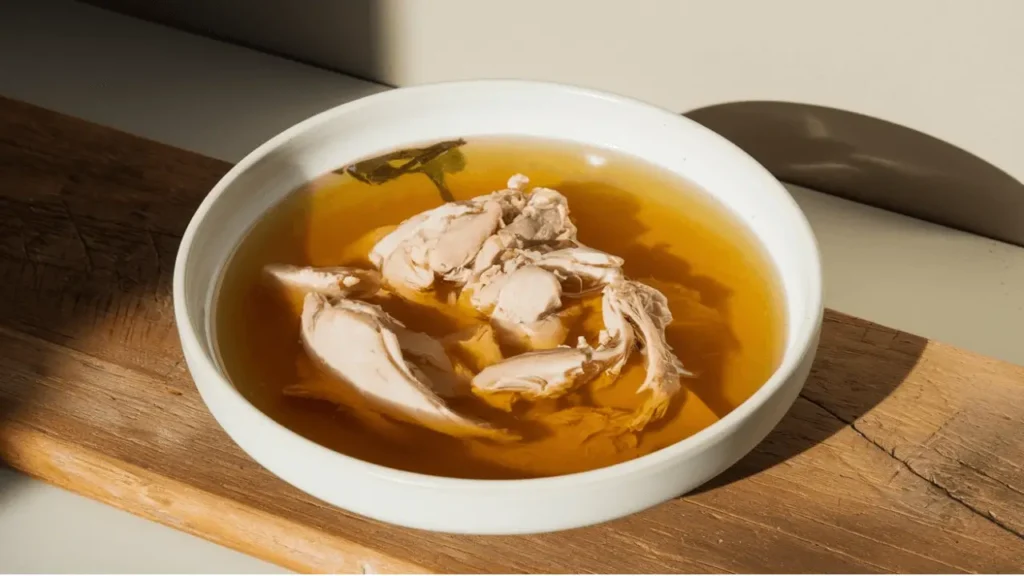Can Dogs Eat Chicken Broth? Benefits, Risks & How to Serve
Table of Contents
- Introduction to Chicken Broth for Dogs
- Nutritional Benefits of Chicken Broth for Dogs
- 2.1. Hydration
- 2.2. Amino Acids and Joint Health
- 2.3. Vitamins and Minerals
- Potential Risks of Chicken Broth for Dogs
- 3.1. Sodium Content
- 3.2. Harmful Ingredients
- 3.3. Allergies and Sensitivities
- How to Safely Serve Chicken Broth to Dogs
- 4.1. Homemade Chicken Broth Recipe
- 4.2. Store-Bought Chicken Broth Considerations
- 4.3. Portion Control and Serving Sizes
- Chicken Broth for Specific Dog Breeds and Conditions
- 5.1. Senior Dogs
- 5.2. Puppies
- 5.3. Dogs with Health Issues
- How to Incorporate Chicken Broth into Your Dog’s Diet
- 6.1. As a Food Enhancer
- 6.2. As a Health Supplement
- Frequently Asked Questions (FAQs)
- Conclusion
1. Introduction to Chicken Broth for Dogs
When it comes to treating your dog with something extra, can dogs eat chicken broth is a common question many pet owners ask. The short answer is yes, dogs can enjoy chicken broth—but there are a few important factors to consider. Although chicken broth offers several health benefits, such as hydration and amino acids for joint health, it’s essential to prepare and serve it properly. If you’re wondering whether dogs can eat chicken broth safely, this article will guide you through the benefits, potential risks, and best ways to serve it to your furry friend.
The short answer is yes, dogs can eat chicken broth. However, there are several things to consider when adding it to your dog’s diet. While chicken broth can provide nutritional benefits, it’s essential to prepare it correctly and serve it in moderation. Chicken broth can be a nourishing treat, but only if it’s made without harmful ingredients.
In this article, we’ll explore the many benefits of chicken broth for dogs, as well as potential risks, how to serve it safely, and the best ways to incorporate it into your dog’s diet.

2. Nutritional Benefits of Chicken Broth for Dogs
Chicken broth isn’t just a flavorful liquid; it’s packed with beneficial nutrients that can improve your dog’s overall health when served properly.
2.1. Hydration
Dogs can sometimes be picky about drinking water, especially when they’re not feeling well. Hydration is crucial for your dog’s health, particularly during illness or recovery. Chicken broth is an excellent way to ensure your dog stays hydrated. It’s mostly water, and the added flavor makes it more appealing to dogs who may not drink enough water on their own.
For dogs recovering from surgery, experiencing digestive issues, or simply in need of extra fluids, adding chicken broth to their meals can keep them hydrated and help maintain their energy levels. It can also aid in preventing dehydration, which can be particularly dangerous for older or ill dogs.
2.2. Amino Acids and Joint Health
Chicken broth is rich in amino acids, including glycine, proline, and glutamine, which are essential for the body’s growth and repair processes. These amino acids can have a positive impact on your dog’s joints, muscles, and connective tissues.
For senior dogs or those suffering from joint pain or arthritis, these nutrients can be a valuable addition to their diet. Glycine and proline, for instance, contribute to the production of collagen, which supports joint health and helps to repair damaged cartilage.
2.3. Vitamins and Minerals
Chicken broth also contains various vitamins and minerals that are beneficial to your dog’s health, including calcium, phosphorus, and magnesium, which are all essential for bone health. Vitamin B12, found in chicken broth, plays a crucial role in energy metabolism and the production of red blood cells.
These nutrients help maintain a healthy immune system and support overall body function, making chicken broth an excellent supplement to your dog’s regular diet.
3. Potential Risks of Chicken Broth for Dogs
While chicken broth can be an excellent addition to your dog’s diet, it’s essential to be aware of potential risks. The benefits of chicken broth are only realized when it’s made and served properly.
3.1. Sodium Content
One of the primary concerns when feeding chicken broth to dogs is the sodium content. Store-bought broths often contain high levels of salt, which can be harmful to dogs, especially those with heart conditions or kidney problems. Excessive sodium intake can lead to dehydration, high blood pressure, and organ strain.
When choosing chicken broth for your dog, make sure it’s labeled as low-sodium or dog-safe. Alternatively, making your own broth at home allows you to control the sodium content and avoid unhealthy additives.
3.2. Harmful Ingredients
Some commercial chicken broths contain onions, garlic, or spices, all of which are toxic to dogs. Even in small amounts, onions and garlic can cause serious health issues, including gastrointestinal upset, damage to red blood cells, and, in extreme cases, organ failure.
Always read the ingredients list carefully before serving chicken broth to your dog. If you’re unsure, homemade broth is always the safest option, as you can ensure no harmful ingredients are included.
3.3. Allergies and Sensitivities
Some dogs may have food allergies or sensitivities to certain ingredients in chicken broth. If your dog has a history of allergies or digestive issues, it’s best to introduce chicken broth gradually and monitor for any adverse reactions. Symptoms such as vomiting, diarrhea, or excessive gas may indicate an intolerance to certain ingredients in the broth.
4. How to Safely Serve Chicken Broth to Dogs
Now that we’ve covered the benefits and risks, let’s dive into how to serve chicken broth to your dog safely.
4.1. Homemade Chicken Broth Recipe
Making chicken broth at home is the best way to ensure that it’s safe for your dog. Here’s a simple recipe to follow:
Ingredients:
- 1 whole chicken (preferably organic or free-range)
- Water (enough to cover the chicken)
- Optional: A small amount of apple cider vinegar (for added health benefits)
Instructions:
- Place the whole chicken in a large pot and cover it with water.
- Bring the water to a boil, then reduce the heat and simmer for 2-3 hours.
- Once the chicken is fully cooked, remove it from the pot and strain out the bones and skin.
- Allow the broth to cool completely before serving.
- Serve small portions to your dog or pour it over their food.
This homemade broth is free from preservatives, sodium, and other additives that may be harmful to your dog. If you want to add more flavor or nutrients, you can include a small splash of apple cider vinegar to aid digestion.
4.2. Store-Bought Chicken Broth Considerations
If you choose to buy chicken broth, ensure that it is low-sodium and free from harmful ingredients like onions, garlic, and artificial additives. Some brands offer broths specifically formulated for pets, which can be a safer choice than regular human-grade broths.
4.3. Portion Control and Serving Sizes
When introducing chicken broth to your dog’s diet, it’s essential to start slowly and monitor their response. Here are some general portion guidelines:
- Small Dogs: A few tablespoons of broth per meal.
- Medium Dogs: 1/4 to 1/2 cup per meal.
- Large Dogs: Up to 1 cup per meal, depending on their size.
Remember to never use chicken broth as a replacement for your dog’s regular meals—serve it as a supplement or a tasty treat.
5. Chicken Broth for Specific Dog Breeds and Conditions
Certain breeds and health conditions require additional consideration when serving chicken broth.
5.1. Senior Dogs
Older dogs often struggle with digestion, dehydration, and joint health. Chicken broth can provide comfort, hydration, and vital nutrients. It’s especially beneficial for senior dogs with arthritis, as the amino acids found in the broth can support joint health and reduce inflammation.
5.2. Puppies
Puppies can benefit from chicken broth too. If they are transitioning from milk to solid food, a little chicken broth can make the process smoother and more appetizing. However, be sure to use low-sodium broth and introduce it slowly to avoid any digestive issues.
5.3. Dogs with Health Issues
Dogs with specific health problems, such as kidney disease or heart disease, require special attention when it comes to salt intake. For these dogs, it’s important to stick to homemade, low-sodium broths and consult with a vet before adding any new foods to their diet.
6. How to Incorporate Chicken Broth into Your Dog’s Diet
Chicken broth can be incorporated into your dog’s diet in several ways. Here are two great methods:
6.1. As a Food Enhancer
If your dog is a picky eater or struggling with a loss of appetite, chicken broth can be an excellent way to encourage them to eat. Simply pour a little broth over their dry food to add flavor and make the meal more enticing.
6.2. As a Health Supplement
For dogs with health conditions, chicken broth can be served as a supplement to help with recovery, hydration, and joint health. It’s a simple way to boost your dog’s overall well-being without disrupting their regular feeding routine.
7. Frequently Asked Questions (FAQs)
Can Chicken Broth Help a Dog’s Digestion?
Yes, the amino acids in chicken broth can support digestive health by soothing an upset stomach and improving gut function.
Can Dogs Drink Chicken Broth Every Day?
In moderation, chicken broth can be a daily supplement to your dog’s diet. However, it should never replace regular meals.
Is Store-Bought Chicken Broth Safe for Dogs?
Store-bought chicken broth is safe as long as it is low-sodium and free from harmful additives like onions and garlic. Always read the label carefully.
Can Chicken Broth Make Dogs Sick?
If the broth contains harmful ingredients or excessive sodium, it could upset your dog’s stomach or cause health issues. Always ensure that you’re serving safe, homemade broth.
8. Conclusion
Chicken broth can be a healthy and hydrating treat for dogs when prepared correctly. It offers numerous nutritional benefits, including hydration, joint health, and essential vitamins and minerals. However, it’s important to avoid harmful ingredients and excessive sodium, and always serve it in moderation.
Whether you’re using chicken broth to entice a picky eater or support a dog recovering from illness, it’s a simple and effective addition to their diet. Just remember to make it at home when possible to ensure it’s safe and nutritious.

